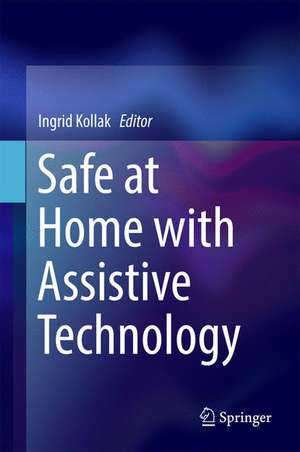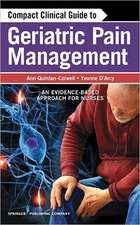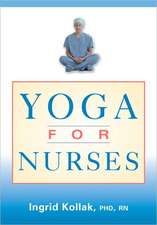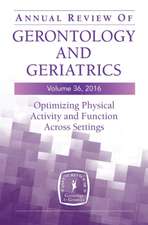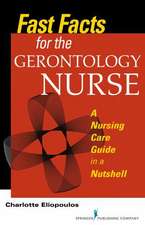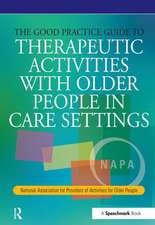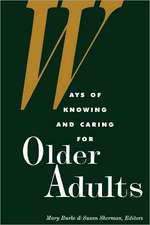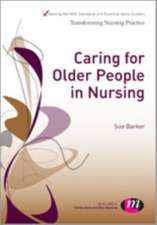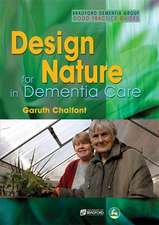Safe at Home with Assistive Technology
Editat de Ingrid Kollaken Limba Engleză Hardback – 9 ian 2017
The book provides insights from user-centred research and uses photographs to illustrate the main topic: how users and technology can work together to ensure safety. User-focused and combining experience with research, the book will interest users of these kinds of technology, health professionals who might introduce and/or prescribe them, engineers who develop and sell assistive technological gadgets, and architects who build safe homes – as well as researchers and students who work in these fields. It provides an overview of the existing technology, examines ways to test its effectiveness from the point of view of users, health professionals and researchers from different fields (architecture, education, engineering, facility management, medicine, nursing, occupational therapy, rehabilitative medicine, physiotherapy, social science and speech therapy), and lists useful addresses, websites and literature
| Toate formatele și edițiile | Preț | Express |
|---|---|---|
| Paperback (1) | 397.37 lei 6-8 săpt. | |
| Springer International Publishing – 7 iul 2018 | 397.37 lei 6-8 săpt. | |
| Hardback (1) | 404.29 lei 6-8 săpt. | |
| Springer International Publishing – 9 ian 2017 | 404.29 lei 6-8 săpt. |
Preț: 404.29 lei
Preț vechi: 425.58 lei
-5% Nou
Puncte Express: 606
Preț estimativ în valută:
77.37€ • 80.48$ • 63.87£
77.37€ • 80.48$ • 63.87£
Carte tipărită la comandă
Livrare economică 14-28 aprilie
Preluare comenzi: 021 569.72.76
Specificații
ISBN-13: 9783319428895
ISBN-10: 3319428896
Pagini: 230
Ilustrații: VIII, 230 p. 48 illus., 29 illus. in color.
Dimensiuni: 155 x 235 x 14 mm
Greutate: 0.52 kg
Ediția:1st ed. 2017
Editura: Springer International Publishing
Colecția Springer
Locul publicării:Cham, Switzerland
ISBN-10: 3319428896
Pagini: 230
Ilustrații: VIII, 230 p. 48 illus., 29 illus. in color.
Dimensiuni: 155 x 235 x 14 mm
Greutate: 0.52 kg
Ediția:1st ed. 2017
Editura: Springer International Publishing
Colecția Springer
Locul publicării:Cham, Switzerland
Cuprins
Prerequisits.- Living safely and actively in and around the home Four applied examples from avatars and ambient cubes to active walkers.- Using gaze control for communication and environment control How to find a good position and start working.- Caring TV – for older people with multimorbidity living alone Positive feedback from users in Berlin and rural Mecklenburg-West Pomerania.- Arm rehabilitation at home for people with stroke: staying safe Encouraging results from the co-designed LifeCIT pro-gramme.- Telemonitoring in home care Creating the potential for a safer life at home.- Empowering the elderly and promoting active ageing through the Internet The benefit of e-inclusion programmes.- Use and development of new technologies in public wel-fare services A user-centred approach using step by step communication for problem solving.- Parents’ experiences of caring for a ventilator-dependent child: a review of the literature.- Evaluation and outcomes of assistive technologies inan outpatient setting – a technical-nursing science approach.- Assistive technology for people with dementia: ethical considerations.
Notă biografică
Ingrid Kollak is currently a professor in the fields of health care and nursing with more than 20 years experience with direct client and patient contacts. A leader of studies on health care and technology, which cooperate with users, health professionals from different fields as well as small companies developing assistive technology and counsellors, Professor Kollak is also an author of a range of books on self-care, health-care organisation and health interventions.
Textul de pe ultima copertă
This book describes how assistive technology can help handicapped, elderly and acutely sick people to manage their daily lives better and stay safe in the home. It discusses how safety is understood from an ethical, technical and social perspective, and offers examples of the problems that users, their helpers and professional carers have with assistive technology in everyday situations.
The book provides insights from user-centred research and uses photographs to illustrate the main topic: how users and technology can work together to ensure safety. User-focused and combining experience with research, the book will interest users of these kinds of technology, health professionals who might introduce and/or prescribe them, engineers who develop and sell assistive technological gadgets, and architects who build safe homes – as well as researchers and students who work in these fields. It provides an overview of the existing technology, examines ways to test its effectiveness from the point of view of users, health professionals and researchers from different fields (architecture, education, engineering, facility management, medicine, nursing, occupational therapy, rehabilitative medicine, physiotherapy, social science and speech therapy), and lists useful addresses, websites and literature.
The book provides insights from user-centred research and uses photographs to illustrate the main topic: how users and technology can work together to ensure safety. User-focused and combining experience with research, the book will interest users of these kinds of technology, health professionals who might introduce and/or prescribe them, engineers who develop and sell assistive technological gadgets, and architects who build safe homes – as well as researchers and students who work in these fields. It provides an overview of the existing technology, examines ways to test its effectiveness from the point of view of users, health professionals and researchers from different fields (architecture, education, engineering, facility management, medicine, nursing, occupational therapy, rehabilitative medicine, physiotherapy, social science and speech therapy), and lists useful addresses, websites and literature.
Caracteristici
Details how assistive technology can help handicapped, elderly and acutely sick people can manage their daily lives Includes photographs to illustrate how users and technology can work together to create safety Offers examples of the difficulties related to assistive technology that users, their helpers and professional carers experience in everyday situations Includes supplementary material: sn.pub/extras
